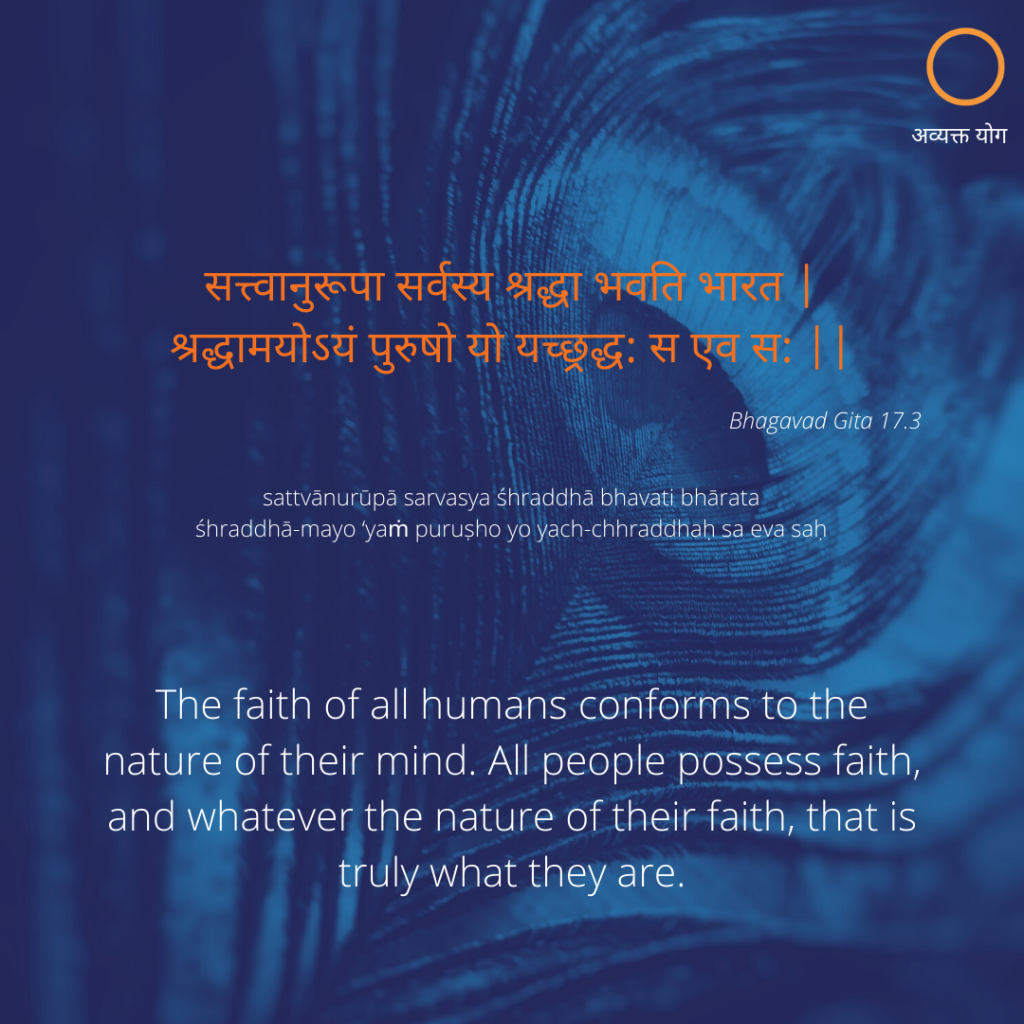सत्त्वानुरूपा सर्वस्य श्रद्धा भवति भारत |
श्रद्धामयोऽयं पुरुषो यो यच्छ्रद्ध: स एव स: ||
sattvānurūpā sarvasya śhraddhā bhavati bhārata
śhraddhā-mayo ‘yaṁ puruṣho yo yach-chhraddhaḥ sa eva saḥ
Bhagavad Gīta – 17.3
The faith of all humans conforms to the nature of their mind. All people possess faith, and whatever the nature of their faith, that is truly what they are.

Everyone has certain base beliefs. I don’t mean religious beliefs, but that central belief process that drives each one of us. If we believe that money will make us happy, we dedicate all our time and effort in the process of acquiring money. If we believe that knowledge is paramount, we spend all our efforts and energies in acquiring knowledge. And if we believe in spiritual pursuits, our thoughts and energies are focused in that direction at all times.
Notice that the word used is śhraddhā – śrat – our truth, and dhā – or hold (in the heart). Śhraddhā is that deep truth that you hold in your heart – your truth – which may be different from mine and anyone else’s truth. It is what you truly believe in, regardless of your religious practices. Śhraddhā is also used to describe intense devotion – to your God, to your work, to anything that you work hard to attain.
Also, the verse starts with sattvānurūpā – here sattvā doesn’t refer to the gunās (rajas, tapas being the other two), but to our antaḥkaraṇa or bundle of impressions that comprises Ahaṃkāra, or ego, buddhi, or intellect, manas, or mind, and citta, or memory. This is what we are from the inside, shaped by the continuous impressions that we have acquired from birth – our experiences that we gather and help mould our thinking and character.
Śri Krśna says that whatever we hold in our mind as our true faith, our lives are moulded in that direction.
And in turn, the quality of our true faith is decided by the nature of our mind, and by what we give our full attention and energy to. Hence, we have to choose wisely. Our śhraddhā, our one-pointed focus, should be towards pursuits that matter – the shreya or the good that leads to lasting welfare for the whole.
We can also examine the nature of our mind, by reviewing our actions – how we behave, what we do on a daily basis, and how we go about our interactions. From my academic background – you can call this a sort of reverse-engineering – starting from the result, and working backwards to devise the problem.
Watch your actions – they are the biggest clue to your faith, and your faith is your clue to the nature of your mind.
Meditating on this śloka will help us to be mindful on a daily basis, and having śhraddhā on things that matter. This may lead to a fulfilling life, one that is more happy, and more content….
I leave you with the beautiful and nearly-forgotten sounds of the Jal Tarang, and wish you a pleasant day ahead:)
